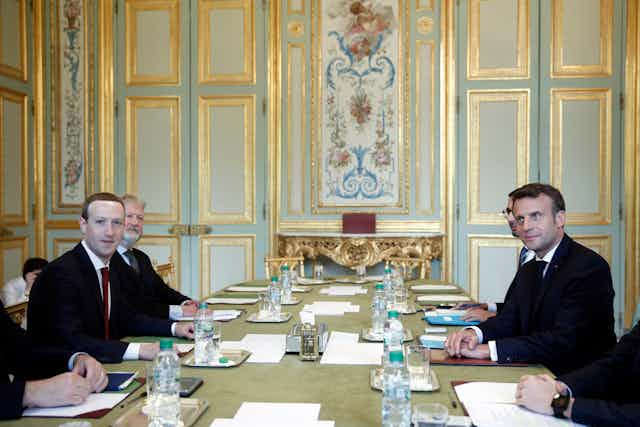In July Facebook was fined US$5.1bn by the US Federal Trade Commission (FTC) for not being honest about how it was handling user data. The personal data of 87 million of its users had been harvested by Cambridge Analytica, a firm which stands accused of building political profiles of individual people in order to influence elections. It is believed that the information was used to influence voters in the US presidential election and the EU referendum of 2016.
The fine is the biggest ever handed down by the FTC. It certainly sounds like a lot, but it isn’t. Facebook’s Q2 earnings, reported the same week, were a better-than-expected $16.9bn. The fine is the amount of money Facebook makes in 27 days. Facebook investors are relieved. Its share price has risen.
The same week, Brexit Party leader Nigel Farage launched World4Brexit, a US-based fundraising operation aimed at enabling “friends of the UK from around the world” to donate to the ongoing campaign to ensure that the UK leaves the EU. World4Brexit is based in Michigan and is a registered non-profit organisation, which means that it can accept individual donations of up to $5,000 without having to name donors.
The Labour Party has called for an investigation following concerns that the organisation will allow foreign “dark money” to subvert the democratic process. Similar concerns have been raised about the Brexit Party possibly receiving donations through Paypal in ways that don’t comply with UK electoral law.
Even if the Labour Party gets its investigation, nothing much will happen. These two events dramatise a tension between money and politics that is unique to the 21st century.
Bigger business, deeper pockets
Wealthy individuals and organisations have a disproportionate influence over elected representatives. This has long been the case, and certainly predates the rise of companies such as Facebook, Google and Cambridge Analytica. But the amount of money these companies have to spend is unprecedented. Apple was the first company to be valued at more than $1 trillion. Alphabet (Google’s parent company) is worth around $900bn; Facebook $560bn. The world’s ten richest corporations now own more wealth than the poorest 180 states combined.
As the wealth of these corporations has grown, so the amount they’ve spent on lobbying has grown too. In 2002, for example, Google spent less than $50,000 on lobbying Washington. In 2017, it spent $18m – more than any other company in the world. In 2018, it spent $21m. Google also spent more money than any other corporation in the US on political donations in the 2016 presidential election
The use of lobbyists by corporations is widespread. Non-corporate organisations haven’t been able to keep up. For every $1 spent on lobbying by labour unions and public interest groups combined in 2015, $34 was spent by large corporations and the associations which represent them.
The new technology of lobbying
There is nothing especially new in corporations translating their wealth into political power or in the fact that power is concentrated among wealthy organisations and individuals.
What is new is that technologies have emerged which concentrate power in the hands of the wealthy and increase inequality of access – on a scale unimaginable only a few years ago. Wealthy companies can move money around the globe instantly and anonymously, in official currencies or in cryptocurrencies, issued by no state. They can use this invisible money to purchase the services of lobbyists, or to donate to political campaigns, in ways that are almost impossible to trace. And they can access information that can be used to bolster their lobbying efforts in ways not open to poorer individuals and organisations.
Human civilisation now has greater access to information than at any point in its history. In an ideal world, this fact should be liberating and empowering. It should enrich democracy, inform citizens and make for a more reflective and egalitarian politics. But we don’t live in an ideal world.
We live in a world in which information – and the expertise necessary to analyse it – comes at a price that only wealthy organisations can pay. From the outside, lobbying may look the same as it always has, but it isn’t – it’s driven increasingly by an information divide. A divide between those who can afford it and those who can’t.
If you want to glimpse this, take a look at the new niche industry which has emerged to help companies leverage complex data in the service of supplying political intelligence and altering the political agenda.
FiscalNote is an example. Based in the US, it uses “artificial intelligence, machine learning, and natural language processing” to scrape the internet for data on politicians, regulations and public policy developments in order to provide paying clients with up-to-the-minute data they can use to target politicians and mobilise grassroots support.
Its clients are some of the wealthiest companies on Earth, including Nestlé, the world’s largest food company ($247bn), Nouryon, the Dutch chemical company ($5bn), and the US Corn Growers Association, which represents the interests of the US field corn and Ethanol industry ($50bn). FiscalNote charges between $US10,000 and “several hundred thousand dollars” a year to enable organisations that can afford it to achieve lobbying successes far beyond what smaller, less resourced organisations can achieve.
We all know now that new technologies have made it easier than ever to influence elections, and to move money around the world in ways which are harder to trace. What’s less visible is the extent to which they have made it easier for the wealthy to lobby more effectively for their interests.
Big data hasn’t levelled the playing field. It has simply allowed wealthy organisations and individuals to further entrench their dominance. And regulators can’t keep up. New technologies make it almost impossible to trace the global flow of money World4Brexit may receive to fund its political campaigning. The FTC’s stern rebuke of Facebook was nothing of the kind. Institutions are scrambling, and failing, to keep pace with the technological changes shaping our politics.

